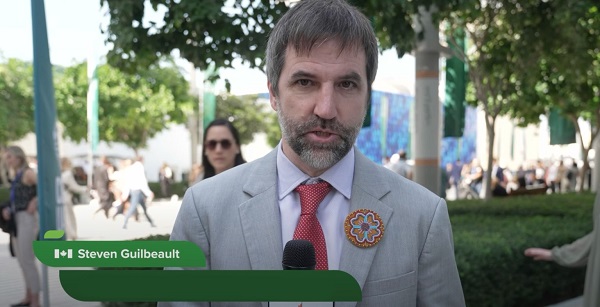Crime
Inside B.C.’s Cultus Lake Narco Corridor — How Chinese State-Linked Syndicates are Building a Narco Empire in Canada
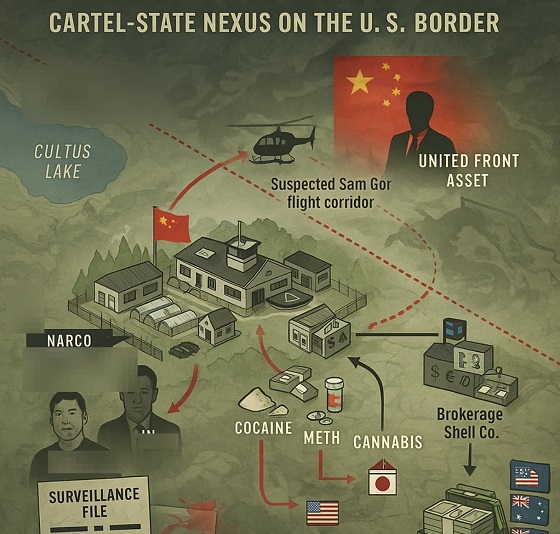
Many of the properties of concern are large-acreage farms with cannabis licenses dating back decades—once controlled by B.C. biker gangs, but quietly consolidated since the early 2000s under the influence of figures linked to the Sam Gor syndicate.
Nestled in British Columbia’s Fraser Valley, hugging the U.S. border, Cultus Lake is surrounded by towering rainforest pines—a postcard image of Canada’s serene beauty. Shaped by the last Ice Age, the south shore’s cavernous ridges form the Columbia Valley, which snakes into Washington State—sparsely populated, with no official border crossing, and peopled mostly by large ranch owners. But the pristine corridor conceals deadly secrets with geopolitical consequences.
According to multiple Canadian intelligence experts, significant Columbia Valley properties have been quietly seized as strategic high ground by associates of the notorious Sam Gor narco syndicate, operating in tandem with agents of the Chinese state’s security and foreign influence apparatus.
“The number of people—nefarious people—who have places down there, it’s quite phenomenal,” an intelligence analyst not authorized to be named said.
“It’s a very difficult place to do any surveillance on. Not a lot of properties, big properties—and anybody that doesn’t have a local license plate or something from there, they just get spotted right away.” Combine that with its location—adjacent to the U.S. border—and, the source added, “it’s got to be some of the most favorable area in the Lower Mainland to be doing any kind of cannabis stuff or drug smuggling.”
Experts describe what amounts to a special zone of Chinese crime and influence activities—tied clandestinely to Beijing in function, if not officially—a secure enclave where key properties have been tied to covert cross-border helicopter operations.
Many of the properties of concern are large-acreage farms with cannabis licenses dating back decades—once controlled by B.C. biker gangs, but quietly consolidated since the early 2000s under the influence of figures linked to the Sam Gor syndicate. The networks tied to these estates, sources say, not only profit from cannabis and sophisticated money laundering brokerages that transfer illicit proceeds—ultimately benefiting the Chinese state—but are also linked to Beijing’s so-called “CCP police station” activities, and numerous significant investigations into fentanyl, methamphetamine, heroin, cocaine, and Chinese precursor imports.
According to one source familiar with U.S. government investigations in British Columbia, one Columbia Valley property stands out with exceptional urgency. Spanning roughly 30 acres and situated steps from the U.S. border, the estate has triggered alarms among The Bureau’s national security sources—not only due to its strategic location, but because of the individuals connected to it.
Chief among them: Sam Gor himself, the syndicate’s elusive boss, a Chinese Canadian named Tse Chi Lop. Of equal or greater concern: a senior Chinese security and intelligence figure with ties to Sam Gor’s upper command, and individuals associated with Chinese mining and chemical interests and Beijing’s United Front Work Department.
According to RCMP sources, the site has also been linked to numerous narcotics investigations in Western Canada and cross-border helicopter activity into Washington State—escalating it from regional concern to a geopolitical flashpoint between Ottawa and Washington.
Among other key figures linked to the property: Peter Lap-San Pang, a Toronto-based alleged Sam Gor associate named in a British Columbia civil forfeiture case involving a suspected illegal mansion casino; and Ye Long Yong, a convicted Sam Gor “kingpin” identified in Canadian court files for importing, exporting, and trafficking heroin, methamphetamine, and cocaine. During a parole hearing, Ye told officials that “a successful person in Toronto gave” him his drug business.
The parole records noted: “There was a great deal of effort from many police organizations from all around the world, with interpreters in several languages and evidence gathered for a long period of time in order to infiltrate and bring down Mr. YE’s criminal organization.”
Also tied to the property is a United Front–associated “Big Circle Boy” contemporary of Tse Chi Lop, who was named in B.C.’s anti-money laundering inquiry as the superior of Paul King Jin—the notorious boxing gym owner, loan shark, and money laundering suspect at the center of Canada’s largest-ever casino money laundering investigation, E-Pirate.
These are just several of the “many other Sam Gor members” associated with this 30-acre farm on the U.S. border, a source said—individuals who have surfaced repeatedly in B.C.’s highest-profile organized crime investigations over the past two decades, including the E-Pirate case.
Most of the Sam Gor and Chinese state-linked suspects tied to this particular Chilliwack-area border property—with the exception of Tse Chi Lop—remain less publicly known than Paul King Jin, whose notoriety has steadily grown since the Vancouver Sun’s 2017 revelations about the RCMP’s failed E-Pirate probe. Jin later survived a high-profile targeted shooting at Richmond’s Manzo restaurant in 2020—an attack that killed his business partner, Jian Jun Zhu, another Sam Gor leader allegedly behind the Silver International operation. That Richmond-based scheme—now infamous for revealing the “Vancouver Model” of money laundering—is believed to have moved hundreds of millions in drug proceeds through a combination of government-regulated and underground casinos, with links to drug-cash banks embedded in diaspora communities across the Western Hemisphere, including Mexico, South America, and hundreds of Chinese bank accounts.
More recently, The Globe and Mail reported troubling information—verified by The Bureau—that Canadian security officials had clandestinely surveilled Jin and other Chinese businessmen privately meeting with then–Prime Minister Justin Trudeau in a Richmond hotel, during the height of the E-Pirate and related Chinese narcotics trafficking investigations in British Columbia.
The U.S. government’s concerns about transnational money laundering suspects tied to this nexus—including individuals connected to Columbia Valley properties and the private meeting with Prime Minister Trudeau—were underscored by a request for RCMP assistance in surveilling several Chinese nationals who, according to one source, arrived in Vancouver on a private jet.
Yet while Jin drew headlines in Canada, Sam Gor leader Tse Chi Lop—who holds Canadian citizenship—operated far more quietly across Vancouver, Toronto, Hong Kong, Macau, Taiwan, mainland China, and the United States prior to his arrest in the Netherlands several years ago. He has long been identified as a top figure in what former U.S. State Department investigator David Asher describes as the “command and control” layer of Chinese Communist Party-linked money laundering in Toronto and Vancouver, facilitating the financial operations of Mexican, Latin American, and Chinese cartels across the Western Hemisphere.
“Tse [Chi Lop] has a long history here [in British Columbia],” one Canadian intelligence expert said. “He’s connected to Jin and the network out here.” Regarding the elite Sam Gor members associated with significant Columbia Valley properties, they added: “There’s state interaction with some key components of those groups.”
One of the key figures associated by Canadian intelligence with the 30-acre Columbia Valley farm, Ye Long Yong, is also little known outside elite international law enforcement circles. But his role in Sam Gor’s transnational operations from Vancouver was extremely significant, an intelligence source said. Filings from his parole hearings underscore this, stating: “Mr. YE operated his criminal organization for years prior to his arrest. He demonstrated his ability to conceal his illegal activities from the authorities for many years.”
Pointing to yet another high-profile property near Cultus Lake, a different source said: “There’s another very, very significant Asian organized crime woman—she had a heavy influence out in that area, to do with cannabis. And she apparently had a lot of higher-level Chinese government connections.”
Another source, familiar with a federal investigation involving an organized crime figure flying a helicopter from the Cultus Lake region into U.S. territory, emphasized long-standing frustrations between allied agencies. “With the choppers and this area around Cultus Lake, I don’t think the Border Integrity team at Federal Serious and Organized Crime has ever truly continued paying attention,” the source said. “That’s why DEA and others are so pissed with the RCMP—not truly following up, not looking at the details. That corridor has been known for years.”
For Canadian intelligence veterans watching the pattern, the explanation points to more than simple organized crime. “This is for years to come,” one source said. “You set things in place in environments you can monitor, inside and out. Thinking like special forces—you pick the high ground, the environment where you can survey everything around you to maintain the integrity and safety of your product. That’s why the corridor is so special to organized crime. You can do that there.”
While these properties—and the alleged helicopter missions they support into the United States—offer a visceral glimpse of the threat posed by Chinese transnational networks engaged in poly-narcotics trafficking and money laundering, the deeper, state-linked financial architecture behind them is best illustrated by the RCMP’s startling findings. Investigators uncovered a global laundering network rooted in Vancouver-area brokerage houses, discreetly embedded in residential neighborhoods. These firms are tied to large-acreage land acquisitions across British Columbia used to cultivate cannabis for Asian organized crime.
Beneath the surface, authorities believe these operations fuel a broader system of poly-drug laundering, narcotics transshipment to other nations concealed within Canadian consumer exports, and coordination with Beijing’s foreign influence apparatus.
The Bureau will report next in this series on a groundbreaking investigation into the United Front brokerage system—an apparatus that facilitated narcotics trafficking from British Columbia into New York City and laundered drug proceeds from the United States back to Sam Gor and United Front networks in Vancouver.
There is mounting evidence that this same system—leveraging “legal” cannabis operations and money laundering brokerages tied to crime figures associated with Chinese consulate diplomats—is now suspected of operating not only in British Columbia but also in Ontario, with transnational reach into multiple U.S. states, including Maine.
Yet only fragments of evidence in official Canadian files hint at the “interoperability” between Chinese narco networks and the United Front Work Department, including its political influence arms.
British Columbia and Ontario have emerged as key battlegrounds where Chinese interference and triad-linked organized crime networks have deeply penetrated society. According to Canadian and U.S. experts who spoke with The Bureau, this includes the integration of the Sam Gor syndicate with Beijing’s intelligence and foreign influence apparatus, operating under the umbrella of the United Front Work Department.
Due to the sensitivity of the matter, the only expert identified in interviews is David Asher, who stated that the U.S. government views the United Front as the envelope surrounding China’s underground banking and financial networks—the same networks believed to have infiltrated TD Bank in Toronto.
Multiple Canadian police sources across British Columbia, Alberta, and Ontario confirmed that Chinese diplomats have been observed meeting with senior figures in Asian Organized Crime, including actors tied to the 30-acre “farm” property on the U.S. border near Cultus Lake.
The only known record pointing to official Canadian acknowledgment of these networks was first obtained by Global News in its reporting on Beijing’s Fox Hunt operations. The document—drafted at the request of B.C.’s Solicitor General in 2023—prompted the RCMP to prepare a classified briefing for Premier David Eby’s government. The version released under Freedom of Information legislation was completely redacted and titled: “The People’s Republic of China: Foreign Actor Influence Undertaken by the Chinese Communist Party / United Front Work Department & Interoperability with Transnational Organized Crime.”
Editor’s note: Come back to read The Bureau’s exclusive, paywalled investigation into United Front brokerage houses and illicit grow-ops—operations powered by exploited illegal immigrants.
The Bureau is a reader-supported publication.
To receive new posts and support my work, consider becoming a free or paid subscriber.
Invite your friends and earn rewards
Crime
The “Strong Borders Act,” Misses the Mark — Only Deep Legal Reforms Will Confront Canada’s Fentanyl Networks
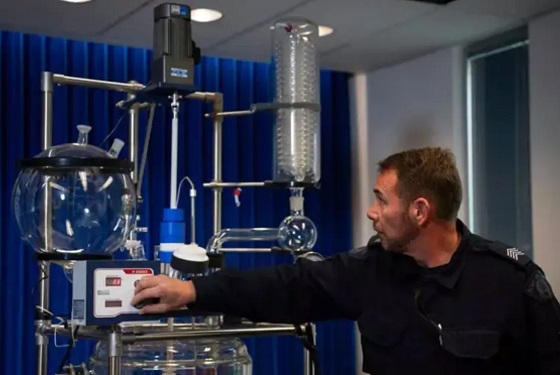
The fallout is a grim roll call of major investigations that collapsed before trial in British Columbia, Alberta, Ontario, and Quebec: Project E-Pirate, E-Nationalize, Syndicato, Cobra, Brisa, and Endgame all aborted.
Bill C-2, Ottawa’s so-called “Strong Borders Act,” promises to secure Canada’s frontiers with new surveillance powers, sweeping ministerial discretion, and higher penalties. But as veteran Canadian investigators know, the bill misses the point. It is an omnibus solution that expands the state’s reach online, while leaving untouched the very legal choke points that have made Canada a permissive financial platform and fentanyl laboratory for cartels, Triads, and state-linked terror networks.
For more than a decade, Canadian and U.S. enforcement leaders have pointed to the same failures. Police are confronting transnational fentanyl labs, a flood of Chinese chemical precursors, Hezbollah-linked laundering, and Mexican cartels setting up on Canadian soil.
Yet they are forced to fight these threats with laws “never designed for today’s criminal landscape,” as Canadian Chiefs of Police president Thomas Carrique recently warned.
Former RCMP investigator Calvin Chrustie testified before British Columbia’s Cullen Commission that, due to judicial blockages arising from Charter of Rights rulings, by 2015 it had become effectively impossible to obtain wiretaps on Sinaloa Cartel figures in Vancouver.
This year, RCMP Assistant Commissioner David Teboul said a proliferation of “commercial-grade chemistry” fentanyl labs in British Columbia — like the sophisticated factory dismantled last year in Falkland, north of Lake Okanagan, where Mexican cartels have quietly taken over domestic biker gang networks — underlined the urgent need for legislative reform.
Canada wasn’t always so overwhelmed by lethal foreign gangs. What happened? Overly permissive immigration rules and porous borders explain part of the story, but the deeper problem lies in the laws that have steadily eroded enforcement power since the early 1990s.
Instead of enabling prosecutions against transnational traffickers of humans, narcotics, and weapons, unintended consequences from misguided jurisprudence surrounding Canada’s Charter of Rights now ensure these cases almost always collapse, or are simply avoided by the Crown.
Two Supreme Court rulings — Stinchcombe and Jordan — have gutted the capacity to prosecute complex crime. Stinchcombe requires exhaustive disclosure of sensitive intelligence, often impossible in Five Eyes investigations that depend on close cooperation between Canada and the United States.
Jordan imposes strict trial ceilings that tick down while Stinchcombe disclosure battles drag on. Criminal lawyers know these two rulings function as trump cards stacked in favor of their clients.
The fallout is a grim roll call of major investigations that collapsed before trial in British Columbia, Alberta, Ontario, and Quebec: Project E-Pirate, E-Nationalize, Syndicato, Cobra, Brisa, and Endgame all aborted. Project Collecteur — a landmark probe linking Hezbollah and foreign terror-financing networks across Canadian cities to transnational drug money laundering, built on U.S. and Australian intelligence — barely made it to court, despite its far-reaching implications.
It was crippled by RCMP corruption and by underfunded, risk-averse agencies that abandoned Canadian leads painstakingly developed by Five Eyes partners.
How bad was it?
Farzam Mehdizadeh, a major Iranian money launderer and suspected weapons proliferation actor who ran a Toronto currency exchange while shuttling bags of drug cash between Toronto and Montreal, escaped back to Iran just as the RCMP was poised to arrest him on money-laundering charges. The beneficiary of a leaky national police force, evidently.
A senior U.S. enforcement source told The Bureau that during Project Collecteur, the RCMP stumbled onto an even bigger Chinese money launderer while probing Iranian networks, but the agency ignored the file — reportedly unable to shift its original investigation focus onto new enterprise targets.
These kinds of policing failures and decisions are part of the reason President Donald Trump has said senior U.S. investigators told him that Canada lacks the resources and capacity to confront fentanyl trafficking gangs.
In Washington, there is frustration — and at times a lack of understanding — that Stinchcombe either bars or effectively scares the Mounties out of cooperating with U.S. agencies or sharing intelligence.
Derek Maltz, former DEA chief under President Trump, pointed to the Falkland fentanyl super-lab case — part of a U.S.-led probe into Chinese precursor suppliers — as the latest example of “historical issues with the RCMP not sharing properly,” calling it a “major disaster that happened on that big lab in British Columbia.”
“It goes down to the basic information sharing, the antiquated laws,” Maltz said. After meeting with current Canadian police leadership, he concluded: “They’re so far behind and the laws are so antiquated and so archaic.”
The cost is staggering. Officers walk away from enterprise files, knowing they cannot meet disclosure or trial deadlines. Prosecutors refuse to take high-risk cases. U.S. agencies stop sharing intelligence that could be exposed in open court. Canada defaults to “low-hanging fruit” prosecutions while the upper echelons of global networks operate with near impunity.
Meanwhile, at the border, permissive Non-Resident Importer rules allow foreign entities to move chemical precursors through Canadian ports under layers of corporate opacity. Chinese logistics hubs repackage bulk fentanyl shipments bound for Vancouver, obscuring Canada’s visibility into their true origin. Once in Canada, packages can be collected by foreign nationals who further conceal their identities. To visualize the scheme, think of an “end-to-end encryption” app — Chinese trafficking networks enjoy the same kind of seamless concealment when shipping narcotics into Canada.
At the same time, Vancouver’s port — stripped of federal police under Jean Chrétien’s Liberal government — has container inspection rates below one percent, according to a British Columbia study.
It doesn’t seem that Bill C-2 will do anything to address these core vulnerabilities. It gives Ottawa broad powers to expand online surveillance, which may help with the drug networks that now brazenly advertise street sales on social platforms. But it would do so by subjecting all Canadians to invasive cyber surveillance. The bill does not target the transnational criminals who are already easy to identify and well known to law enforcement. These networks continue to operate openly in Canada, confident that the Charter shields them from real prosecution.
Meanwhile, experts warn that parts of C-2 resemble Ottawa’s wish list of new powers tossed into a grab bag. The effect is the opposite of inspiring public confidence or addressing the real enforcement crisis. As written, Bill C-2 could do more harm than good. Mark Carney’s government should shelve it and start again with the reforms Canada actually needs.
The Bureau is a reader-supported publication.
To receive new posts and support my work, consider becoming a free or paid subscriber.
Crime
Drug trafficker says Trump battle with the cartels is making an impact

Quick Hit:
A Sinaloa Cartel leader told CNN that President Trump’s border crackdown has made cartel operations “much tougher,” admitting the gang’s smuggling business has been disrupted by the administration’s hardline approach.
Key Details:
- CNN correspondent David Culver interviewed the masked cartel member in the back of an SUV. The man — clad in black clothing, gloves, and sunglasses — conceded that Trump’s policies have made his criminal work harder, responding flatly, “Oh yeah. Yeah.”
- He said Trump’s border enforcement has disrupted cartel routes and made smuggling riskier, limiting the group’s ability to operate freely.
- The trafficker, who admitted to killings and cross-border crimes, said he wanted to warn others, telling CNN, “It’s not a life. It’s not good… Once you get in, you can’t get out.”
A member of the Sinaloa Cartel — responsible for trafficking untold amounts of deadly drugs into our country — says President Trump has unquestionably made his job tougher.
The Trump Admin will not relent until this evil has been eradicated from our country once and for all. pic.twitter.com/1dNYEHlyQi
— Rapid Response 47 (@RapidResponse47) September 30, 2025
Diving Deeper:
In a rare on-camera interview, a senior figure in Mexico’s Sinaloa Cartel — once run by Joaquín “El Chapo” Guzmán — acknowledged that President Donald Trump’s border and immigration crackdowns are taking a toll on cartel operations. CNN’s David Culver conducted the shadowy interview in the back of an SUV, describing the man as a hardened killer who has “done it all — from killing to coordinating smuggling operations.”
Asked directly if Trump’s border actions have made his job more difficult, the man didn’t hesitate. “Oh yeah. Yeah,” he replied. When Culver pressed further, he added, “Yep.” His matter-of-fact admission underscored what many border agents have long said — that Trump’s aggressive policies are slowing cartel activity and making it costlier, riskier, and far less predictable.
CNN noted that under Trump’s enforcement posture, major smuggling routes have been cut off or heavily monitored, forcing traffickers into less profitable, more dangerous corridors. Those operational disruptions have led even cartel insiders to acknowledge the effectiveness of U.S. countermeasures.
Despite his own record of violence, the masked trafficker told Culver that he wanted to deter others from following his path. “It’s not a life. It’s not good,” he said in broken English, before warning in Spanish, “Once you get in, you can’t get out.”
The man’s comments echoed those of former Sinaloa operative Margarito “Jay” Flores Jr., who told Fox News last month that Trump’s “aggressive approach” would “send a strong message to every drug trafficker across Latin America.” Flores, who worked under El Chapo’s network, said the Trump administration’s actions had already shaken criminal supply chains across Mexico and Central America.
That aggressive campaign appears to be continuing. NBC News recently reported that U.S. forces are preparing operations targeting cartel-linked trafficking hubs inside Venezuela — part of a broader strategy to dismantle networks at their source.
Taken together, the admissions from cartel veterans and the administration’s expanding reach leave little doubt: even the world’s most ruthless traffickers are feeling the pressure. President Trump’s border crackdown is working — and the cartels know it.
-
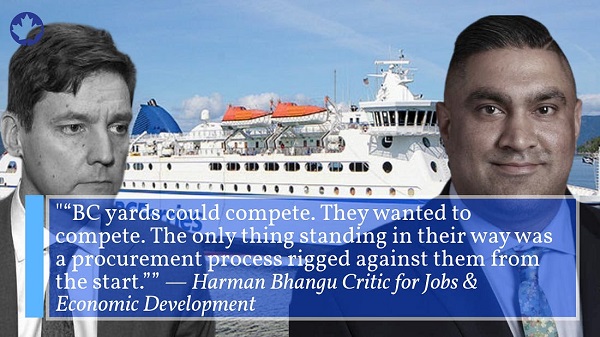
 Business1 day ago
Business1 day agoJobs Critic says NDP government lied to British Columbians and sold out Canadian workers in billion dollar Chinese ferries purchase
-

 Indigenous2 days ago
Indigenous2 days agoBloodvein First Nation blockade puts public land rights at risk
-
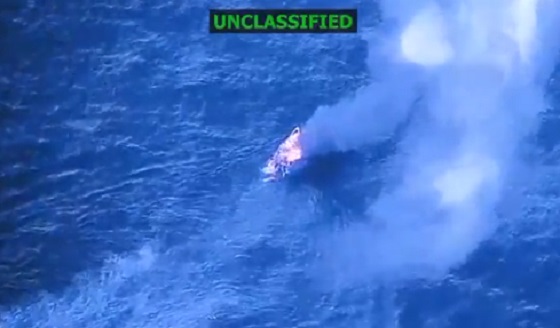
 International2 days ago
International2 days agoTrump says U.S. in ‘armed conflict’ with drug cartels in Caribbean
-

 Automotive16 hours ago
Automotive16 hours agoBig Auto Wants Your Data. Trump and Congress Aren’t Having It.
-

 Business1 day ago
Business1 day agoDemocracy Watch Drops a Bomb on Parliament Hill
-
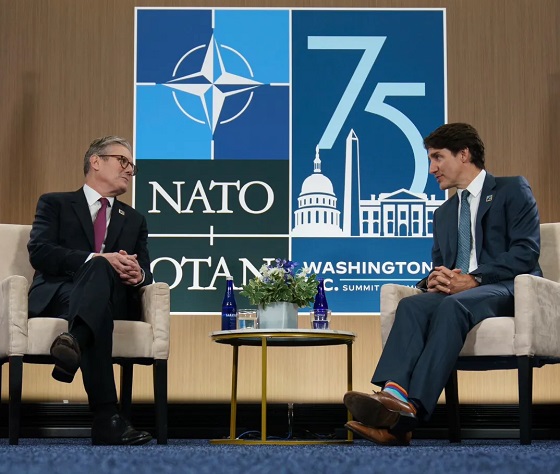
 espionage4 hours ago
espionage4 hours agoStarmer Faces Questions Over Suppressed China Spy Case, Echoing Trudeau’s Beijing Scandals
-

 Alberta19 hours ago
Alberta19 hours agoJason Kenney’s Separatist Panic Misses the Point




